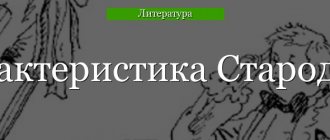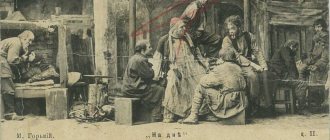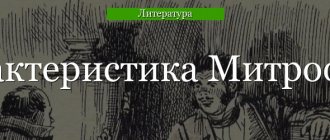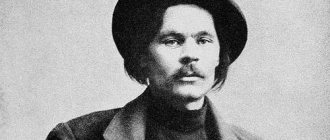Portrait
Starodum is a man of the old school. He served during the reign of Peter I. He is admired by the Tsar's progressive views on the education of the young nobility and the transformation of the Russian state. He has a negative attitude towards modern orders and people striving for profit and wealth, far from high moral principles and rules. In the comedy, these people are personified by Skotinin and the Prostakovs.
Starodum is about 60 years old. He is Sophia's uncle and her guardian. For a long time, the nobleman served the Tsar and the Fatherland, and when he retired, he went to live in Siberia. There he managed to earn a decent fortune, which he bequeathed to his niece Sophia.
Starodum comes from an old noble family. His father served at the court of Tsar Peter. Sophia's guardian himself received a decent upbringing. In his youth he did a lot of self-education, so he is well-read and educated.
Starodum is quite a famous person. His old achievements are remembered in aristocratic circles. “I myself have the honor of knowing your uncle. And, moreover, I heard things about him from many that instilled true respect for him in my soul,” says Pravdin to Sophia.
For an aristocrat, the words duty, conscience, honor are not an empty phrase, but the meaning of life. He tries to convey the importance of these concepts in the play.
Like all the characters in the play, the hero’s surname is “speaking”: Starodum, that is, someone who thinks in the old way.
Starodum - the reasoner of the comedy "The Minor"
The image of the hero in the work acts as an exponent of the author's ideas. This can be confirmed by Fonvizin’s desire to publish a magazine called “Starodum”. He wanted to do this some time after writing his comedy. However, the magazine was never published (it was banned by Catherine II). Contrasting two completely different ideological sides in the work, belonging to the new nobility and landowners, the author shows a third one, which is present between them and is connected not only with pedigree, training, but with the hero’s own experience.
Starodum did not receive a good education as a child, but was excellently raised by his father. And Fonvizin emphasizes this: a person with the right thoughts in his head can independently learn what he needs, and most importantly, become a noble person.
In addition, using Starodum, the writer sharply condemns the authorities - Catherine II and the court, showing all their shortcomings, emphasizing the treachery and hypocrisy of the aristocracy, the ugly struggle for titles, when everyone is ready to step over the other. Fonvizin, through his hero, says that the ruling monarch must set an example and have such qualities as:
- moral;
- honor;
- righteousness.
This is the best thing a person can have. And society itself also needs changes: it is necessary to change direction and follow the path towards humanity, kindness, and show respect for the Motherland and the people around us.
In our time, the question raised by the author of the comedy about how each individual should behave is still relevant. After all, the behavior of one individual can greatly affect society as a whole.
A briefly described image of the hero of the work will help to understand the main idea of the author, show his vision of Russian society of that era and write an essay on the topic “Characteristics of Starodum in the comedy “The Minor.”
Character
Starodum is endowed with a calm, reasonable disposition. In his youth he was hot-tempered and quick-tempered, but over time he calmed down.
The main character traits of an elderly nobleman are honesty, openness, and straightforwardness. In appearance, he seems a little gloomy and withdrawn.
This hero has a reputation as a wise man. He loves his niece very much, for whose sake he went to Siberia to earn money for her dowry. An uncle wants to find a worthy groom for his beloved niece. Starodum is able to quickly recognize lies, hypocrisy and insincerity in a person, so he rejects the candidates presented by Mrs. Prostakova - Mitrofan and Skotinin, and gives preference to the young officer Milon.
Biography and character traits
As a mouthpiece for the author's views, Starodum, of course, is somewhat sketchy, not as colorful and entertaining as the negative heroes. But in comparison with the ideal official Pravdin and the noble officer Milon, the elderly nobleman looks more realistic. The author gave him a rather complex, contradictory biography, controversial character traits, and forced him to talk about some of the mistakes he had made. So Fonvizin emphasized that Starodum’s thoughts were suffered by him and are the result of difficult experience.
As a young officer, the hero became bitterly convinced that not all of his colleagues considered military service a high honor, a sacred duty to the country. For most, the army is only a way to achieve a high position in society. It is those who pursue career goals who achieve success, receive ranks and awards, without even participating in battles. Having seen a lot of other injustices in the army, the young officer resigned. With age, he understands that this act is a big mistake of an immature, too hot young man. After all, the fewer honest officers there are in the troops, the easier it is for evil to take root there. It is necessary not to run away from where dishonor is happening, but to the best of our ability to restore justice. By leaving the army, Starodum only cleared the way for evil.
The nobleman spent some time at court, believing that it was there, at the very pinnacle of power, that the fate of the state was determined. However, he did not find among the ruling elite people concerned with the good of the country and people. Every nobleman thinks only about his own well-being and therefore strives to please those in power. Anyone who, like Starodum, is concerned about the best state structure, sooner or later is squeezed out of the court environment. A heightened sense of justice makes the hero’s stay at court impossible.
Starodum achieves real success by abandoning his ambitious plans and leaving for Siberia. Earning a fortune in distant lands, he simultaneously works for the benefit of his homeland - he contributes to the development of uninhabited space and the development of industry. Living business, practical work ultimately turned out to be the most correct choice for an honest and active person. Immersed in his affairs in Siberia, Starodum almost lost Sophia. Now he regrets that he did not take care of the girl in a timely manner and allowed her to end up in the Prostakov family. This could have a detrimental effect on the spiritual qualities and fate of the young noblewoman. But the uncle provided the niece with a fortune sufficient for money not to play a role in the choice of a spouse. As a person responsible for the life of a young relative, Starodum guides her choice, but does not decide anything beyond the will of Sophia herself.
A look at parenting
In the comedy, two opposing lines in educating the younger generation are clearly visible: Starodum and Prostakova. The lady does not strive to give her son a decent education and raises him in the image and likeness of herself and her husband. The teachers hired for the “minor” cannot teach Mitrofanushka basic concepts due to his mother’s interference in the process. Prostakova teaches her son lies, hypocrisy, greed and cunning, i.e. the concepts by which she herself lives.
Starodum is trying to raise Sophia in the best traditions of the nobility of Peter the Great's era. He instills in the girl the concepts by which he himself lived his life. The uncle instills in his niece the idea that the main qualities in a person are honesty, good behavior, and mercy. Education is one of the components of a person, but the most important qualities of a real citizen are an open heart and a kind soul, “... have a heart, have a soul, and you will be a man at all times,” Starodum recalls the words of his father.
The old nobleman has a negative attitude towards ill-gotten wealth; he believes that quick and dishonest money corrupts and spoils a person.
Essay: The image of Starodum in the play “The Minor” (D.I. Fonvizin)
(457 words) During the reign of Peter the Great, new trends emerged aimed at transforming the country in the field of science, service and state defense. The nobility at that time was the main force on which the ruler relied. That is why representatives of the upper class were given many rights and freedoms. Many ambitious and active nobles actively contributed to the development of Tsarist Russia, and some took advantage of the privileges granted and preferred to lead an idle lifestyle. The Prostakov family from Denis Ivanovich Fonvizin’s work “The Minor” belonged to the category of ignoramuses of lordly Moscow. However, the author also gave a positive example of a nobleman from the outgoing Peter the Great era - Starodum. Despite the fact that at the time of the play the descendants of the great king reign, and much has changed, Starodum retained the way of thinking of his ancestors.
The hero appeared in the play unexpectedly: distant relatives did not know what happened to him in distant Siberia, but still hoped for his inheritance. Their hopes were not in vain: Starodum, a natural nobleman and retired military man, was able to honestly earn capital and now had an income of 10,000 rubles. He planned to bequeath this money to his niece Sonya, because he was old (about 60 years old). However, to decide the girl’s fate, he came in person and upset the Prostakovs’ plans. Yet his role in the play is more important than it seems at first glance: he not only brought negative characters to light, but also expressed the main idea of the book. The author put into the mouth of this hero everything that he wanted to teach his contemporaries. Thus, he considered the main priority in life not intelligence, but virtue, because education without good morals only brings harm. That is why the submissive Sophia, ready to fulfill her uncle’s will, became Starodum’s ideal. People, according to Starodum, must pacify their pride and direct their minds to the benefit of the state, honestly fulfilling their duty:
“My father constantly repeated the same thing to me: have a heart, have a soul, and you will be a man at all times...”
Starodum often refers to the orders given to him by his father:
“My father raised me the way he did then, but I didn’t even find the need to re-educate myself. He served Peter the Great,” the elder recalls.
These remarks become the main instrument of condemnation of the era that the writer found. Great things, in his opinion, are in the past, and now people achieve success through hypocrisy and flattery. But his hero lived in the old way, so he “decided to retire for several years to the land where money is obtained without exchanging it conscientiously, without vile service, without robbing the fatherland.” The example of Starodum is a lesson to those who seek to squeeze the treasury to their whims, but at the same time do nothing for the development of the country. In addition, the hero was an honest and open person, which could not be said about most courtiers:
“From birth his tongue did not say yes when his soul felt no.”
All these qualities indicate that the image of Starodum is the ideal of an enlightened and patriotic nobleman.
Thus, Starodum is the link between comedy and edifying parable, the combination of which gave birth to a play in the spirit of classicism. Thanks to him, the viewer not only laughed, but also learned how to live.
Author: Polina Boriskina
Characteristics of speech
The work devotes a lot of space to Starodum’s long monologues about education, honor, citizenship, attitude towards people, and in particular towards serfs (“... it is unlawful to oppress one’s own kind through slavery”), about wealth and attitude towards it.
The old nobleman’s speech is literate and correct, very close to literary. The phrases are clearly structured. In conversation he often uses aphorisms. (“Ranks begin - sincerity ceases”, “Golden blockhead - still a blockhead”).
There is no insincerity or deceit in Starodum’s words. He says what he really thinks and feels.
Characteristics of Starodum in the comedy “The Minor” by Denis Fonvizin
The image of Starodum in the comedy “The Minor” is one of the most powerful and unambiguous. Against the background of this hero, other comedy characters, especially negative ones, are revealed especially brightly, fully revealing their already unsightly character traits. Without a doubt, Starodum is one of the key figures of the entire work, and Starodum’s life principles are relevant and deserve respect today.
Fonvizin’s comedy describes not just events relating to one family; using its example, the entire life and customs of the nobility and the life of the landowners for the most part are described. Of course, Sophia’s uncle is one of the main characters in the play, in addition, he is a reasoner - that is, through his lips the author speaks to us, conveys the morality that he puts into his work.
Characteristics and image of Starodum
- Starodum is not young - he is about sixty years old, and he devoted most of his life to serving his Motherland in the way he understood to be correct. His father raised him in the spirit of the Peter the Great era, when one person was addressed in the singular, and it did not occur to people to count one for many. But each person was worth many. And the hero does not consider it necessary to relearn differently, to break himself and readjust to orders that do not evoke respect and response in his soul.
- That era of Peter the Great remained for Starodum the basis, the bar to be equal to. In a conversation with the hero, Pravdin notes that the upbringing of that time consisted of a few rules, and his interlocutor clarifies: “One thing... Have a heart, have a soul, and you will be a man at all times.” “Starodum is guided in his life by this rule.” And the heroes of the play, who at an intuitive, deep level, feel a response to this rule in themselves - Pravdin, Sophia and Milon.
Biography and upbringing of Starodum
- Sophia's uncle entered military service in his youth, and coped with it with dignity, and he regarded the declared war as a chance and an excellent opportunity to prove himself, his courage and bravery. Not all young nobles shared this enthusiasm; moreover, the one whom Starodum considered his friend made efforts to avoid such a scenario and did not participate in hostilities. However, the further development of events was as follows.
- The hero's former friend, the count, who happily avoided military service on the front line, was granted a rank. And this happened precisely at a time when Sophia’s uncle was having difficulty recovering from a serious wound. This injustice deeply disappointed him, and the hero left military service. The hero does not tolerate injustice, he organically cannot remain calm in such a situation, his soul and heart require decisive action.
- After his resignation, he went to St. Petersburg and stayed at court for some time, however, he realized that the morals and rules accepted there were alien to him, Starodum left the court. He himself speaks about this with calm dignity and even irony:
- “I left the court without villages, without a ribbon, without ranks, but I brought mine home intact, my soul, my honor, my rules.
- Next, Sophia's uncle went to Siberia, and there he made a fortune - by honest work, without resorting to meanness and without dirtying his hands with theft.
From all the above points, one can form a fairly complete image of the hero - a straightforward and honest man of advanced years, who puts honor and dignity above all else, and other people’s desires to make money at someone else’s expense, rudeness and bestiality, cause him ardent rejection. His straightforwardness and sincerity are often mistaken by others for rudeness and harshness. Never in his deeds, thoughts and words did the hero go against himself - if he felt rejection, he never agreed with it and did not put up with it.
- After he returned from Siberia, he goes for his niece, Sophia, and has the intention of happily marrying her off, and in this he sees joy for himself. Her family happiness worries him, and making Sophia the heiress of his capital, he says the following:
- “...I have gained so much so that at your marriage the poverty of a worthy groom will not stop us...”
- Sophia’s entourage, the Prostakov family, Skotinin, who is trying to marry Sophia, Mrs. Prostakova, who is strenuously wooing Mitrofanushka as the husband of Starodum’s niece - all these people evoke in the hero only negative emotions, diluted, however, with irony, sometimes bordering on sarcasm.
- Milon and Pravdin, in turn, evoke sympathy from the hero. Separately, it should be noted that Sophia’s lover made a positive impression on Starodum before it turned out that Milon was the nephew of Starodum’s old friend. And the news that Sophia and Milon have a cordial inclination towards each other made him happy, and he, seeing the happiness of the young people, blesses the marriage.
If we talk about this character’s aphorisms , a dozen, if not a hundred, can be identified from the text of the play. However, the most important thing, both according to Starodum and Pravdin, is the following:
“...I have a rule - don’t start anything in the first movement...”





